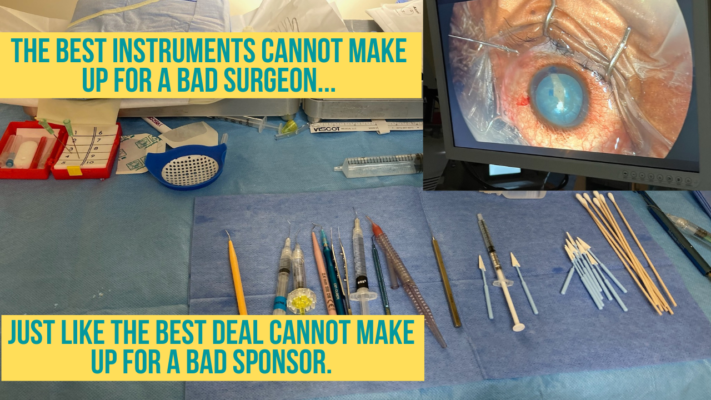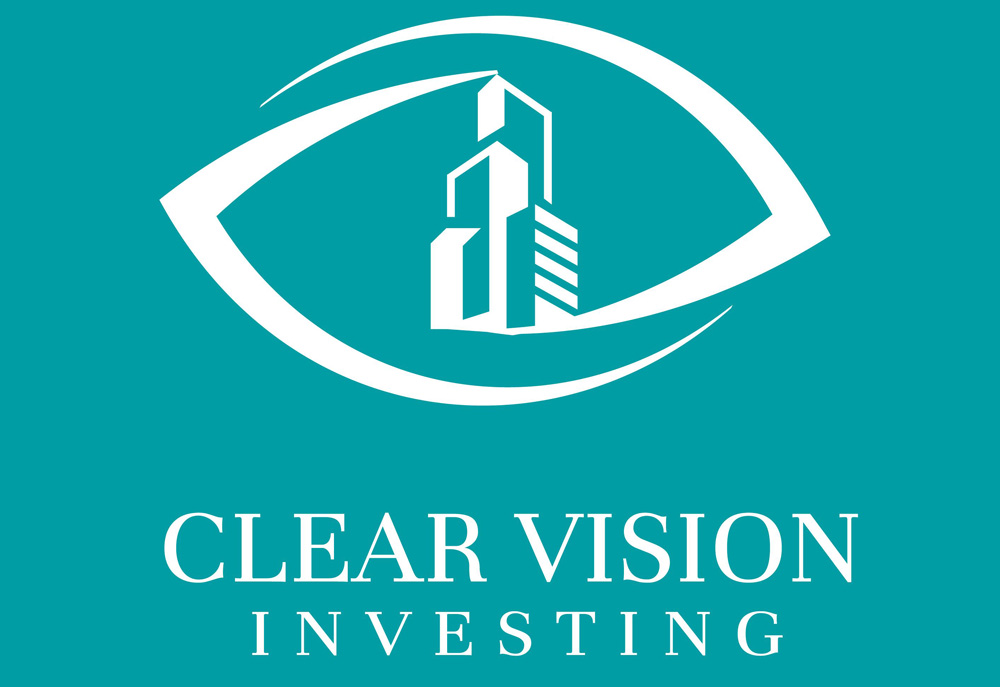I’m an eye surgeon and have spent the past 10+ years refining my surgical skills. When patients come to me for their cataract surgeries, they have usually already done their due diligence on my reputation, experience, and track record. They have researched me online, read reviews, or were referred to me by their friends and family.
Similarly, when vetting a syndication opportunity, it’s important not to focus on the deal first, but on the sponsor.
There are 3 universal components to every deal:
- The Sponsor
- The Market
- The Deal
Of these, the SPONSOR is the most important. Just like a surgeon has a huge role in determining the outcome of a surgery, the sponsor plays a significant role in determining the outcome of a deal.
You can give the fanciest machine and sharpest instruments to a novice cataract surgeon, but he or she wouldn’t know what to do. In contrast, the most experienced, skilled surgeon can perform cataract surgery with the most rudimentary equipment.

Great sponsors can salvage a mediocre deal (just like a great surgeon can salvage an otherwise disastrous case), while a bad operator can ruin an otherwise great deal (just like a bad surgeon can ruin an otherwise perfect eye).
Okay, I think I’ve beat the importance of the sponsor to death. So let’s go over five practical steps you can take to evaluate a sponsor:
#1. SEARCH ON GOOGLE & SOCIAL MEDIA
Start by doing your research online. In today’s world, we have the internet at our fingertips. Google the sponsor and see what you find. Look to see if there’s anything concerning, like fraud, bankruptcies, felonies, and regulatory (state and SEC) violations.
Then check to see if they have any social media accounts (Facebook, Instagram, Linkedin, Twitter). Dig around there a bit.
You’ll be surprised how the sponsor’s online presence can tell you quite a bit about them, their values and their reputation.
You actually want sponsors who have built up a brand and a strong online presence, as their reputation is on the line. As the saying goes, “It takes years to build up trust but only a few seconds to destroy it.”
If someone has taken the time to build up a reputation, it’s unlikely that he or she will want to destroy that stellar character and reputation.
#2. CONNECT WITH SPONSOR
If nothing from your online search makes you want to run away, then connect with the sponsor. Most sponsors will have a way for you to book a call with them.
This introductory call is an important part of the vetting process, as it’s not just an opportunity for you to learn about the sponsor, but also for the sponsor to learn about you. The sponsor should have an interest in learning about you: your goals, your risk tolerance, and your suitability for investing.
After your call with the sponsor, ask these questions:
- Does the sponsor take an interest in you?
- Does the sponsor interact professionally and consistently across the board (online, social media, offline, at meetings, in emails and calls)?
- Is the sponsor confident yet humble? Does the sponsor have a healthy dose of fear?
- Does the sponsor have a good investment thesis (know what they invest in, where they invest, and why they invest)? Does this investment thesis align with your goals?
- What is your gut feeling about the sponsor?
#3. LOOK AT TRACK RECORD
Let’s say after the call, your gut tells you that you can trust the sponsor, then the third thing to do is to look at their track record.
Below are five categories and associated questions to consider when evaluating a sponsor’s track record:
1. Time
-How long have the sponsors been investing in real estate?
-How long have they been investing in the specific type of real estate being offered?
2. Current & Historical Properties/Markets
-How many properties/units have they acquired? How many do they currently own?
-Are these similar to the one currently being acquired?
-How long has the sponsor been in the geographical market?
-How many units have they owned and managed in this market?
3. Market Cycle Experience
–Have they been through any previous market cycles? If so, how did they fare?
4. Full-Cycle Deals
-How many investments have gone full-cycle (bought, managed and sold)?
-How did these deals perform relative to the original projections? (Prior performance is important, but does not indicate future performance. Focus on what drove that success and whether those factors can be replicated for future deals).
5. Focus/Niche
-Does the sponsor specialize in one specific strategy, location and asset class?
Remember, too much variety leads to distraction. The best operators are hyper-focused. They are not everything for everybody.
You want to know that the sponsor has experience buying similar deals and has been successful at executing on the business plan for similar deals in a particular market.
#4. EVALUATE THE TEAM
Next, you want to make sure the sponsor has a strong, well-rounded team that can execute on the business plan.
Look for a team with well-thought out roles, which includes:
- Acquisition
- Due diligence
- Legal
- Accounting & Taxes
- Asset management
- Property management
- Investor relations
Some specific questions to ask here are:
- Is there an experienced acquisition person on the team?
- Is there a dedicated asset management professional who has managed the specific deals you’re buying?
- Who is the property management team? Why do they feel this specific property manager is the right fit for the project? Have they managed similar properties in the same market?
The overlying theme here is that you want to be confident that the team can execute on the business plan and do what they say they’re going to do.
#5. TRUST BUT VERIFY: BACKGROUND CHECK & REFERENCES
If you’re feeling pretty good about the sponsor up to this point, the last step is to verify.
The three things you can do here are:
1. Perform a background check: Pretty self-explanatory. Some good sites for this are TLO.com and verivest.com
2. Get investor references: I usually try to search for these investors myself (rather than asking the sponsors for “references”…because seriously, which person would give him- or herself a bad recommendation?). Ideally, I’d like to get three types of investor references: current investors, past investors, and investors who have invested in multiple deals with the sponsor.
3. Get references from professional contacts: An even better idea is to get references from the sponsors’ professional contacts, like their property manager, lenders and brokers. These people have nothing to gain and often have deep insights into how the sponsors run their businesses. For instance, they can tell you how the sponsors communicate, if they follow through, and comment on their quality of work.
CONCLUSION
The sponsor is the most important aspect of any deal. Don’t be myopic and only look at the deal itself, but carefully vet the sponsor first. Take the necessary time to ensure that they’re trustworthy, qualified and aligned with your values and goals.
To help you properly vet sponsors, get our free due diligence checklist here.

